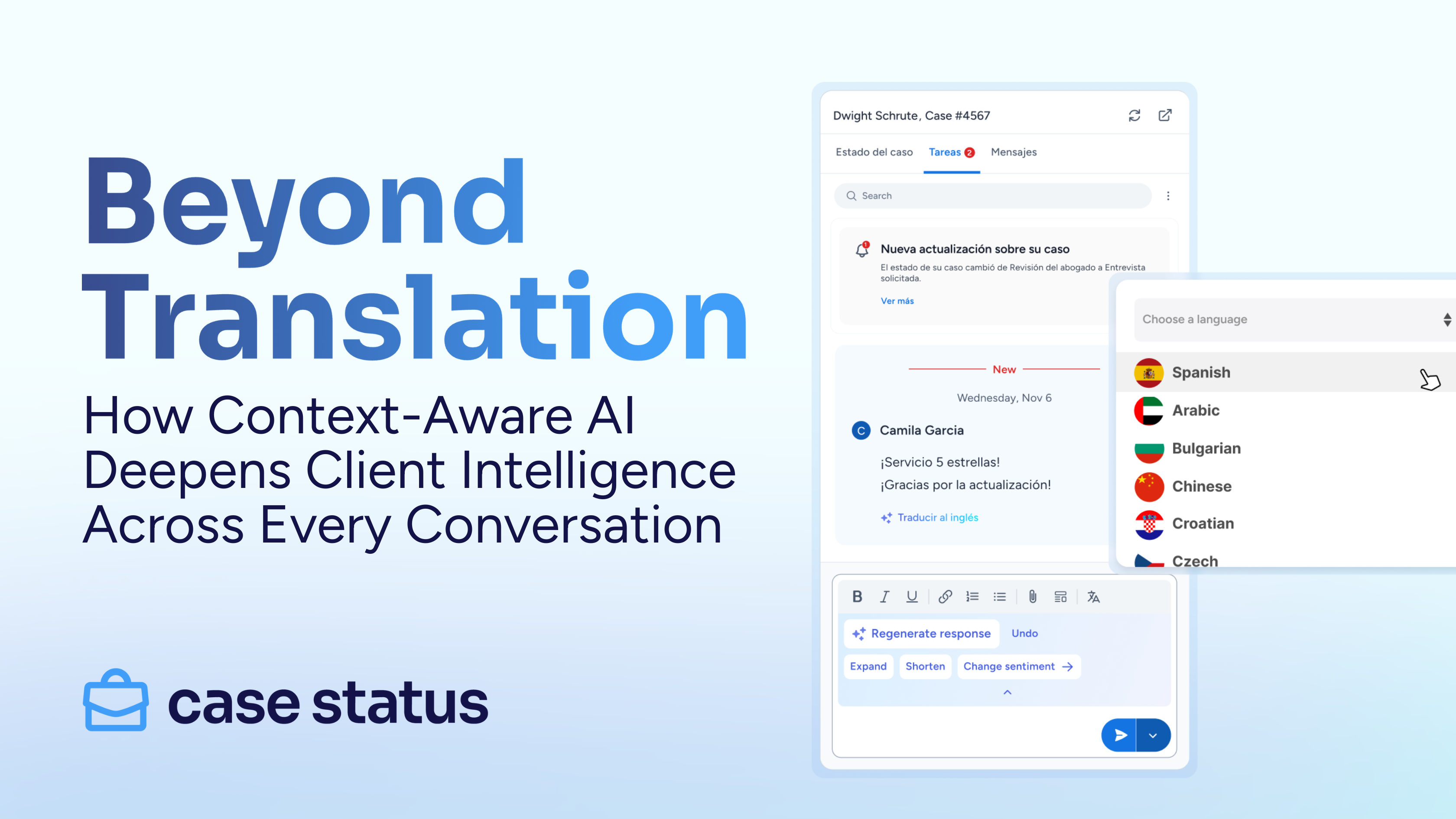
Are Fears About AI Replacing Legal Professionals Overblown?
Guest Post by McKay Ferrell - VP of Product, Assembly Software
About this Post:
Case Status is excited to have a guest this month blogging on the topic of AI as we approach our own launch of an AI solution focused 100% on client engagement!
We are proud to be a strategic integration partner with Assembly Software, and their flagship cloud-based case management solution, Neos. Assembly Software is a visionary software technology company that blends decades of history and industry experience with next-generation, customer-focused innovation. It brings together two of the legal profession’s pioneering case management brands, Needles and Trialworks, both of which have contributed to Neos, Assembly's reimagined cloud-based solution. Neos is a visionary cloud-based case management platform that enhances any law firm’s productivity with configurable workflows, embedded AI automation, seamless integrations, and robust BI-enabled analytics. Learn more about Neos.
Now, lets answer the question: Are Fears About AI Replacing Legal Professionals Overblown?
In a recent report, “The Potentially Large Effects of Artificial Intelligence on Economic Growth,” Goldman Sachs estimates that 40% of legal tasks performed in the U.S. could be automated. Princeton research predicts that the legal industry will be among the top 20 most affected professional sectors. ChatGPT passed the bar exam with flying colors—will it replace you?
Why the legal industry is ripe for AI disruption
Positions in the legal sector, including paralegals and legal assistants, often involve consuming and synthesizing substantial information, ultimately translating complex details into concise legal briefs or opinions. AI can analyze complex legal matters, scrutinize, mark up, and comprehend extensive textual content, simplify complicated legal concepts for the layperson, and even rapidly generate meticulously articulated legal paragraphs—with minimal errors and remarkable speed. (Oh, and did we mention it will do all this at a fraction of the cost of what a human would charge?) It’s not surprising that a Law.com survey revealed one-quarter of law firms expect AI to replace internal jobs within five years. It’s understandable for legal professionals to be concerned if they focus exclusively on this data. Jobs comprised of mostly transactional tasks are perennially vulnerable to automation, even if these tasks require a high degree of intelligence and competence to execute effectively.
But let’s turn our focus to another bedrock of the legal industry: client relationships. No matter how skilled an AI technology is at churning out briefs, reviewing documents for risks, or translating legalese into English, it simply cannot fulfil what a real human can offer.
Clients are people, too
When someone contacts a law firm, it’s usually not under the happiest circumstances (unless someone has recently come into a large sum of money from a dear departed aunt whom they never knew existed). Maybe someone is the victim of medical malpractice or is looking to get a divorce. Perhaps they experienced injury due to a product failure or have been harassed at work. People often come to a lawyer because they desperately need help. And when someone needs help, a human touch goes a long way towards client satisfaction.
Going the extra mile
Simply drafting documents or taking action to resolve their issue may get you a handshake and possibly a timely payment for services rendered, but it won’t endear you to them in a way that motivates them to write rave reviews or tell their friends and family that your firm is the best firm for their type of problem. You need to deliver customer service that goes above and beyond transactional activities to generate that intense positive reaction. And sometimes, it’s not even all that hard to keep your clients happy with your work (if you get them the desired result, of course) if you keep them in the loop.
Communication is key
One of the best ways to show how much you care about your clients is by giving them regular updates on their case. While you may be working on upwards of 100 cases, every client feels like theirs is the most important and should be prioritized. When they don’t hear from you regularly, they may assume you have deprioritized their case or, even worse, are not actively working on it when nothing could be farther from the truth. A client portal enables you to provide regular updates to clients with little effort on your part. As long as a client knows you are still advancing their case, it will go a long way toward soothing their anxiety.
When you eventually resolve their case, they’ll be much more likely to shout from the rooftops about what a great lawyer they had because they’ll feel like you had their back the entire way!
AI can replace some tasks—but not legal professionals
Let’s revisit the issue at hand: delegating legal tasks that don’t require compassion or empathy, like drafting demand letters or putting together chronological medical history from patient medical records, are perfect for AI. These are tasks that AI can do faster than you can take your first sip of coffee in the morning. But this is good news for legal professionals who are busy and overworked. They can use AI to produce top-quality documents (that still require human review before sending to a client) in seconds and then use their newfound free time to build client relationships, drum up new business, or tackle business challenges where AI is irrelevant.
Even for non-legal tasks, like communications, AI can be used to lessen the work. Case Status is currently testing integrated AI that recommends a response to an inbound message from a client. Think about it, the recommendation is based on all the previous responses the firm has sent out and make the reply much easier (maybe an edit or two) and much faster (the staffer doesn't have to start with a blank message. This applied AI at the user interface replaces tasks that need replacing.
Don’t stick your head in the sand and deliberately ignore all the hype about AI replacing your job, but don’t get mired in a spiral of doom, imagining how you’ll have to find a new job in the next five years because an algorithm will replace you. (Or worry that you’ll end up moving into your sister’s basemen because she chose to be a hair stylist, a job that will never be outsourced to a bot!)
It’s incumbent upon you to embrace AI to stay competitive—if you aren’t using it to become more efficient, you can bet the firm down the street is, and they’re dying to steal your business.
About the Author
With extensive experience in product management, McKay Ferrell has contributed significantly to various organizations. Currently serving as Vice President of Product Management at Assembly Software, McKay has displayed strategic leadership and innovation. His career highlights include co-founding Gulf Stream Brewing Company, leading product management teams at Vertafore, and driving product development and strategy at Patterson Companies, Inc. McKay's passion for enhancing product life cycles and aligning strategies with business goals has consistently fueled his success in the industry.
Are Fears About AI Replacing Legal Professionals Overblown?



.png)